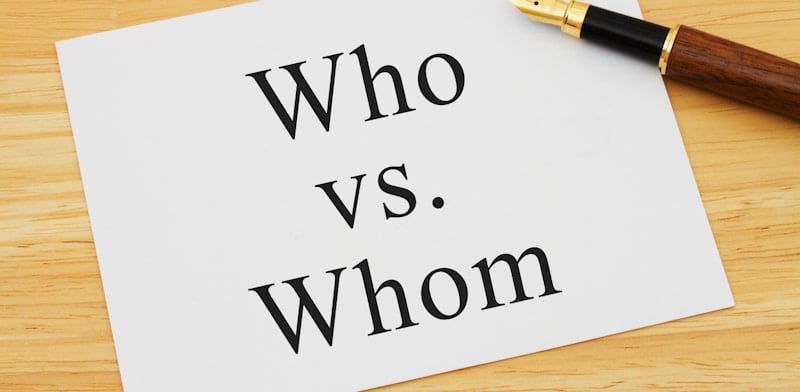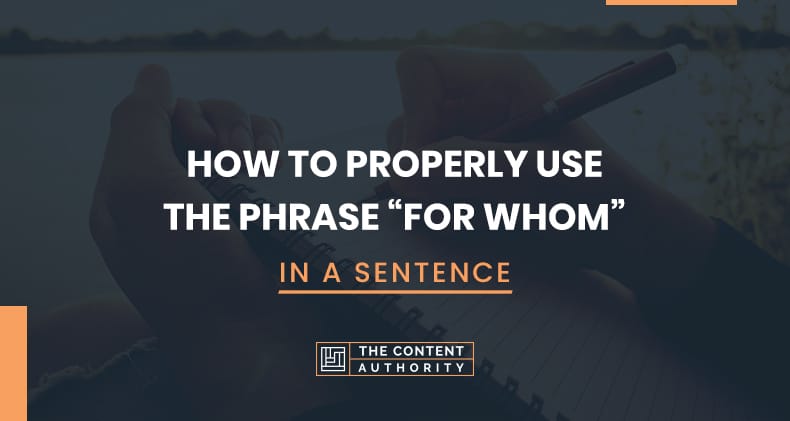The word refers to the individuals and things that receive the action, also, “whom” can be used after the preposition.
Examples:
- Whom are you going to choose?
- Whom did the teacher blame for the chalkboard?
- Whom did she hire for the job?
In a sentence “whom” occupies the position of the object. In this context, the object means a place, thing, or the person that something is done to. This means it takes the place of pronouns such as him, he, her, him, her, us, and them.
When it comes to using it, the word “whom” confounds many seasoned writers and editors inclusive. Take a look at the sentence below:
- Think about who you should invite and who can handle the wild guests.
The sentence above sounds perfect. By the way, in daily conversation, it sounds naturally fine. But in the formal and grammatical context, the first who should be replaced by whom.
From the above example, you can see that you can make mistakes even without knowledge, in using the term “whom”. You need to be cautious to avoid such mistakes. The post is going to provide you with some established tips that will polish you when it comes to applying “whom”.

One of the best advice when it comes to applying “whom” in a sentence is replacing the objective pronoun. For instance:
- Do you love her? – Whom do you love?
- Do you want to cover him? – Whom do you want to cover?
“Whom” Definition
“Whom” is an objective pronoun that is used to replace other pronouns such as him, us, her, us, and them. In other words, “whom” can help you to turn a question into a statement. It must be noted that prepositions such as for, by, in, with, and at mostly comes before “whom”.
In the expressional value, who sounds correct, trouble begins when “whom” emanates as a verb’s object in an area where the clause or subject of the sentence is supposed to be placed.
For example
- Whom do you want to see?
Here the term “whom” appears as a direct object of the verb that is seen, hence, it is in the place where the object should be, making it to be somehow unnatural. What if the same sentence is rewritten?
- You want to see whom?
The above sentence implies that there are situations where “whom” can be used as a direct object. These are some of the “whom” dynamics that you should keep in mind. You can also use “whom” in this manner provided the use appears natural.
Synonyms Of “Whom.”
English words have synonyms. Below are some of the synonyms for “whom.”
- Which
- What
- Which specific one
- Which specific ones
- Which distinct one
- What distinct ones
- What exact one
- Who
How To Properly Use The Word “Whom” In A Sentence
For one to effectively use the term “whom”, he or she should be simple. This means that the user should simplify complex sentences. In this manner, the sentence becomes audible and authentic. Wordy sentences are fond of having some grammatical errors. Therefore, let your sentences have one noun, one verb, and “whom”.
For instance:
- Felista Kerry and her siblings invited people to the party whom they considered to be party animals.
The above sentence appears to be grammatically incorrect. The position of “whom” in the sentence does not provide the required meaning.
Simplification:
- They invited people whom they considered to be party animals.
The sentence sounds correct and the word “whom” is naturally placed.
It should be noted that “whom” means the person or the thing that is acted upon.
For example:
- Whom did you kick?
- His grandparents, whom she adores so much, are in the city.
- The security personnel, whom the company just hired, did not show up today.
If you are keen, “whom” is applied as a kick, but it’s not doing the kicking. In other examples, the term “whom” implies the loved and hired. In the three cases “whom” is applied as the direct object.
Have a look at the following sentences:
- He gave whom the bursary?
- Whom should be allowed first?
- My nephew praised his son.
In the three sentences, “whom” is used as an indirect object. Meaning, the individual that is receiving the end impact. For instance, the bursary was given to somebody. You are implying that the bursary was given to “whom”.
Also, “whom” is mostly used when the pronoun follows the preposition.
For instance, when it comes to the salutation.
- To whom it may concern
The solid fact that you should keep in mind is that you should use “whom” to substitute pronouns. For example:
- You chatted with whom? – (correct sentence)
- Did you chat to her? – (incorrect sentence)
- Did you chat to her? – (grammatically sensible)
- You chatted to whom? – (whom replaces her)
“Whom” Vs “Who”
There’s an ongoing debate in the English arenas about how to use “whom” and who. Rules of the formal grammar state that who should occupy the subject position of a sentence, while “whom” should occupy the object position of the sentence.
“Whom” and who are applied as relative pronouns and users confuse them when it comes to the application. Now that “whom” has already been discussed, it’s time for you to know how to use who. First, who replaces subjective pronouns such as 1, she, me and others.

Examples:
- Who handed the pencil to him?
- Those who do not save, regret it later.
- Who lets the chicken out?
- Sam is the boy who got the opportunity.
Also, who can replace “she”, “I”, and “he.” Mostly it’s used to answer questions. For example:
- Sam built a palace home for his son.
He is the man who built a palace for his son.
- Who is the woman singing?
She is the woman singing.
In an informal set up of application, who is commonly applied. In most scenarios, people tend to speak “who do you want to talk to?” And even though “whom” appears to be an old school term, it is the most formal word between the two. “To whom do you want to talk?”
The following sentences show the formal and informal aspects.
- To whom did you offer it? – Formal application
- Who did you offer it to? – informal application
“Whom” Obligatory
In certain contexts, “whom” can be obligatory especially if it’s preceded by quantifiers like both of, all of, several of, several of, few of, and others. For instance:
- The Wembley arena accommodates 70, 000 participants, all of whom are seated.
- Congratulations to all mothers, most of whom are watching this program
The Most Common Mistake When Using “Whom”
In your reading expedition, you will come across such sentences.
- Betty is demanding restitution from the man whom she claims crashed her car.
- The man who I sold my car to was very pleased with its condition.
In the above examples, the use of who is applicable. The mistake happens when reporting verbs “say” and “claim” have been placed between the subjects, that is (elderly, woman, journalists) and the governing verbs such as (use, has ruined). If you remove them, the sentence will be incorrect because “whom” is used wrongly.
If you find yourself in such situations, you are supposed to do some research on “whom” application on verbs such as think, believe, say, and report. Oxford dictionaries blog will help.
“Whom” Sentence Examples
- In fact, he knew little about the lady with whom he had invited to dinner.
- Whom will you send to Alex’s place?
- At the parking basement, he met two ladies, one whom she knew.
- How different it can, she thought, going to dinner with a person whom you don’t know.
- To whom did he talk to?
- The policeman to whom the student referred was Anthony.
- If anyone whom he knows laughs, he laughs too as if she has had what has been said
- During the training, our coach slapped a player whom he considered not paying attention to the drills.
- I don’t remember the name of the person whom I met at the conference, but I remember that they were from Europe.
- Whom have they lectured?
Bottom Line
“Whom” is one of the complex words of English. If not keen, you will find yourself using it instead of who. The parting shot is that “whom” is an objective pronoun that is used to replace other pronouns such as he, him, and her.
For you to conquer the misuse menace, you need to understand the difference between the use of “whom” and who. “Whom” replaces objective pronouns while “who” replaces subjective pronouns. As a reader, it’s your responsibility to know various aspects of the term “Whom”. You should start with the definition, synonyms, and how to use it.
Shawn Manaher is the founder and CEO of The Content Authority. He’s one part content manager, one part writing ninja organizer, and two parts leader of top content creators. You don’t even want to know what he calls pancakes.


